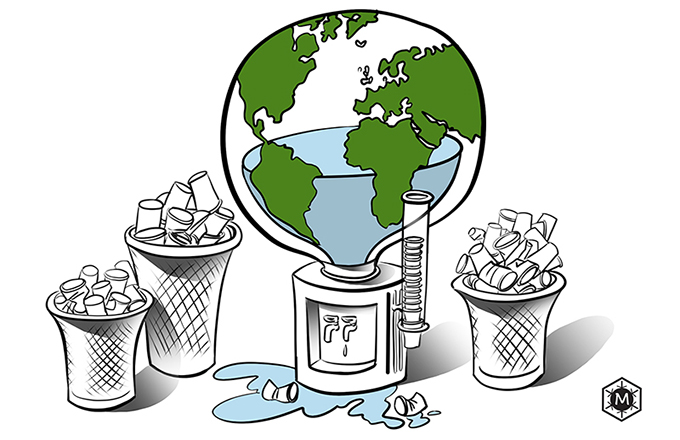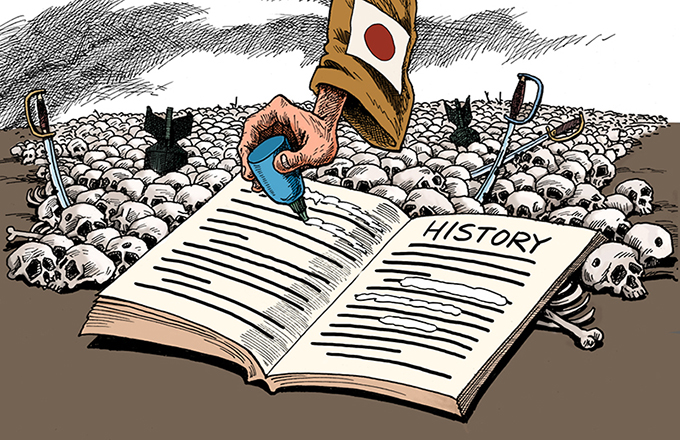Why does Japanese embassy 'act as a spy'?
China's development has caused much concern for Japanese politicians, especially those on the right. Due to fear based on the past logic of "power to hegemony" and a self-envisioned "China threat," Japan aims to contain its neighbor by all possible means.
President Xi Jinping's visit to the U.K. in 2015 sparked a China craze in the country and lifted bilateral relations to a new height. George Osborne, former Chancellor of the Exchequer, also called for creating a "golden decade" of China-U.K. cooperation during his visit in Shanghai in 2015. All of this has caused a large headache for the Abe administration and led to the embassy's disgraceful decision to wage a propaganda campaign against China via a third party.
Why did a British think tank dedicate itself to working for the Japanese embassy?
Even though the transaction of the monthly stipend of 15,000 pounds paid by the Japanese embassy sounds handsome, it remains unimaginable that a prominent think tank like HJS would accept the payment. Moreover, why should the former British Foreign Secretary Malcolm Rifkind act as a conduit for HJS? The reason goes far beyond business transactions. The hostility towards China's social institution and "the Chinese Road" are the true reasons behind the scenes.
In October 2015, the China General Nuclear Power Corporation (CGN) partnered with Electricite De France Group (EDF) to seal an agreement to develop a project at Hinkley Point C. It was the first time that a Chinese enterprise has ever engaged in nuclear power construction in the European market, which, therefore, attracted immeasurable attention from across the world. However, the project has sparked disturbances and doubts from think tanks and the media, hyping security concerns when Britain allows China to be involved in the construction of the local nuclear power plant.
Rifkind confirmed he had been approached by HJS to put his name to an article published in the Daily Telegraph expressing concerns about China's involvement in Britain's Hinkley Point C nuclear plant. Headlined "How China could switch off Britain's lights in a crisis if we let them build Hinkely C," the article made groundless speculation that "no one knows what 'backdoor' technologies might be able to be introduced into the building of a power plant."
Because of such disturbances, the project of Hinkley Point C continued to be protracted as EDF delayed investment in the final phase and the newly elected British government postponed approval in July 2016.
Even though the Hinkley Point C project eventually moved forward after several twists and turns, we can truly feel the repercussion of "China Threat Theory," which is firmly ingrained in the minds of many western countries. The latest reports in The Times have made us truly understand the point, while the intriguing schemes of the Japanese have also been exposed.
Would Japan's little tricks work?
Japan has never lacked the ability to play tricks, especially political tricks. From the September 18 Incident, the Marco Polo Bridge Incident, the Pearl Harbor Attack and the duo performance of the Japanese government and Tokyo authority in attempts to "purchase" China's Diaoyu islands in 2012, Japan has never failed to demonstrate that their gimmicks are always followed by bigger and more vicious schemes.
However, the world has transformed in the past century and China today is no longer the country it once was. China will step forward to the central stage of the world despite the apparent political, economic and military challenges and the schemes both on and off the tables. Without making use of invasion and looting, the development of China relies on assiduous endeavors and sweat of its 1.3 billion people. While making its own progress, China has contributed substantially to the world's economy and provided new approaches to global governance. An increasing number of countries have recognized and accepted China's efforts and devotions, which resonates with a Chinese adage that "a just cause enjoys abundant support while an unjust cause finds scant support." The Belt and Road Initiative proposed by Chinese President Xi Jinping has drawn the involvement of more than 100 countries and made progress in its initial stage; The Asian Infrastructure Investment Bank is running smoothly; multinational cooperation in projects such as the Hinkley Point C has removed hurdles and made headway; the G20 Hangzhou Summit in 2016 demonstrated that China would share its thoughts with the world and propose its ideas … How can independent, just and inclusive development be impeded by dirty tricks?
"The passes and paths are as impregnable as iron, but we are now transcending them from the very beginning."This is the real path to a stronger China.
The author Wang Xiaohui is editor-in-chief of China.org.cn.

























